In an earlier article I noted that mettle and metal were originally the same word, and that over the years these two forms have gradually diverged in meaning, as well as in spelling, to the point where we now feel that they are completely separate words. The same is true of flour and flower, and also kerb and curb.
In the same kind of way feeble in modern English is an adjective which means “weak”, while foible is a noun which signifies a “weakness”; the two forms come from the same French source but emerged at different earlier stages of that language.
Here are two more examples of pairs which were originally the same word: daft and deft, and prune and preen.
I reckon that most of us would prefer to be described as deft rather than daft. In Modern English, deft has a wide range of meanings, all of them positive in some way or other, such as “skilful, dexterous, clever, neat and tidy in action”. Daft, on the other hand, can signify a number of things, all of them negative to different degrees, such as “silly, foolish, stupid, idiotic”.
How can it be that if we go far enough back in the history of the English language, these two words were originally one and the same word?
The linguistic study of meaning is known as semantics. Semantic change is a fascinating but complicated topic, and it is not fully understood exactly how or why the meanings of words change. But it is particularly puzzling that a single word can eventually be transformed into two different words, not least when these forms denote very radically different, and indeed almost opposite, meanings.
Suggested Reading


The words that went their own ways
The two modern words deft and daft descend from the Old English word gedæfte “mild, gentle, meek”. (Old English is the form of our language as it was spoken (and written) up until about 1100 AD. After that, up until about 1500 AD, it is known as Middle English.)
Over time, the meaning of the word daft evolved, with it eventually coming to be used to describe someone who is foolish, silly, or stupid. This semantic shift probably occurred via the notion of someone being humble, suggesting that being mild-mannered can be perceived as a sign of weakness or even of stupidity.
Similarly, prune and preen also come from the same single source. Prune is a familiar word in horticultural contexts, referring to cutting off or shortening branches or other parts of a plant to improve its growth, shape, or health, or to control its size. The word can also be used figuratively to mean reducing or eliminating anything which is unwanted or unnecessary.
Preen in its original, ornithological sense refers to birds tidying and cleaning their feathers with their beaks. The link between the meanings of the two forms prune and preen must have come about because of the perceived similarity of the selective plucking action of a bird’s beak when it preens its plumage to the actions of a gardener pruning a tree or other plants.
According to the Oxford English Dictionary, the verb to preen is now often used not just of birds, but also of people devoting a great deal of effort to improving their appearance, “frequently with the implication of pride in and admiration of the result”; so, to titivate oneself, make oneself look smart.
Titivate
The etymology of the word titivate is uncertain, but it might well have emerged as the result of a blend of two forms such as tidy and cultivate.




